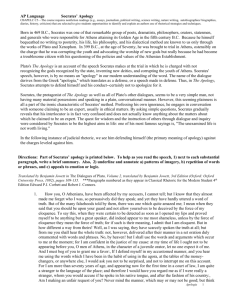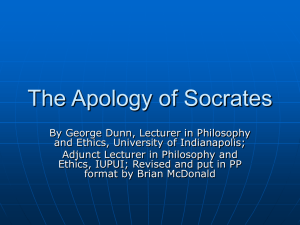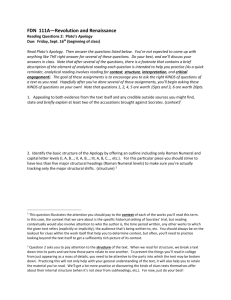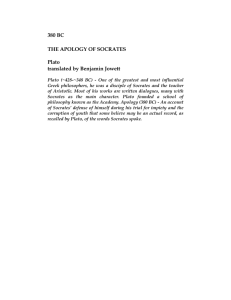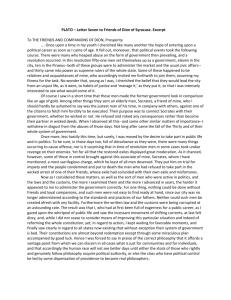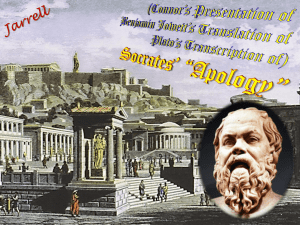Plato Apology - TomRichey.net
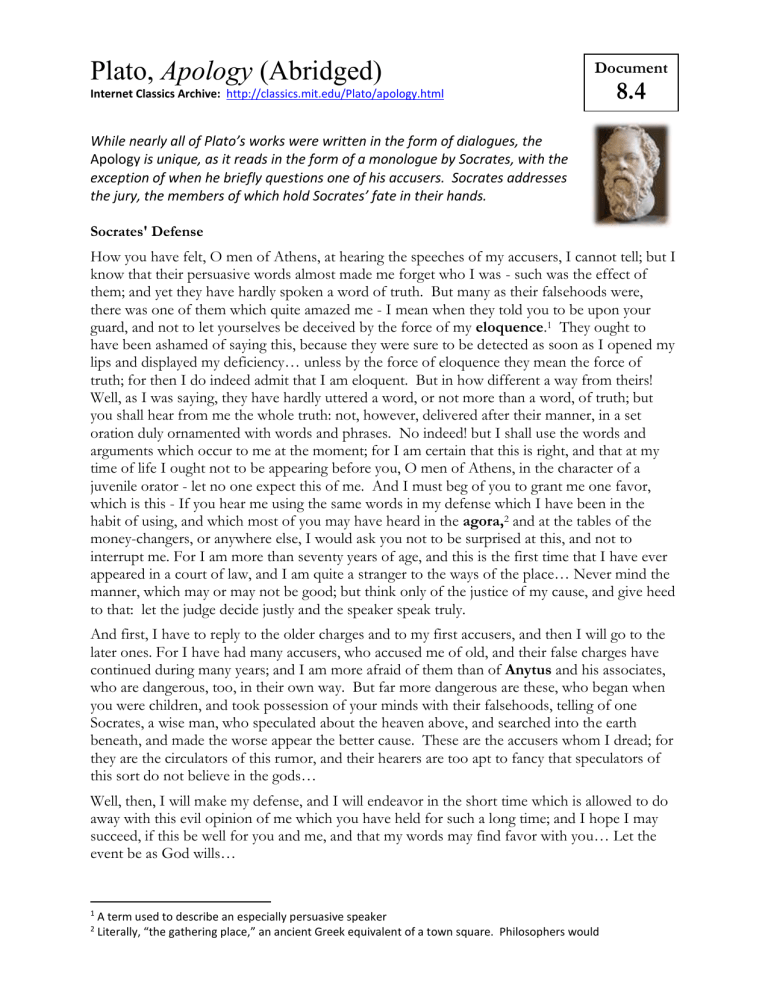
Plato, Apology (Abridged)
Internet Classics Archive: http://classics.mit.edu/Plato/apology.html
Document
8.4
While nearly all of Plato’s works were written in the form of dialogues, the
Apology is unique, as it reads in the form of a monologue by Socrates, with the exception of when he briefly questions one of his accusers. Socrates addresses the jury, the members of which hold Socrates’ fate in their hands.
Socrates' Defense
How you have felt, O men of Athens, at hearing the speeches of my accusers, I cannot tell; but I know that their persuasive words almost made me forget who I was - such was the effect of them; and yet they have hardly spoken a word of truth. But many as their falsehoods were, there was one of them which quite amazed me - I mean when they told you to be upon your guard, and not to let yourselves be deceived by the force of my eloquence.
1 They ought to have been ashamed of saying this, because they were sure to be detected as soon as I opened my lips and displayed my deficiency… unless by the force of eloquence they mean the force of truth; for then I do indeed admit that I am eloquent. But in how different a way from theirs!
Well, as I was saying, they have hardly uttered a word, or not more than a word, of truth; but you shall hear from me the whole truth: not, however, delivered after their manner, in a set oration duly ornamented with words and phrases. No indeed! but I shall use the words and arguments which occur to me at the moment; for I am certain that this is right, and that at my time of life I ought not to be appearing before you, O men of Athens, in the character of a juvenile orator - let no one expect this of me. And I must beg of you to grant me one favor, which is this - If you hear me using the same words in my defense which I have been in the habit of using, and which most of you may have heard in the agora, 2 and at the tables of the money-changers, or anywhere else, I would ask you not to be surprised at this, and not to interrupt me. For I am more than seventy years of age, and this is the first time that I have ever appeared in a court of law, and I am quite a stranger to the ways of the place… Never mind the manner, which may or may not be good; but think only of the justice of my cause, and give heed to that: let the judge decide justly and the speaker speak truly.
And first, I have to reply to the older charges and to my first accusers, and then I will go to the later ones. For I have had many accusers, who accused me of old, and their false charges have continued during many years; and I am more afraid of them than of Anytus and his associates, who are dangerous, too, in their own way. But far more dangerous are these, who began when you were children, and took possession of your minds with their falsehoods, telling of one
Socrates, a wise man, who speculated about the heaven above, and searched into the earth beneath, and made the worse appear the better cause. These are the accusers whom I dread; for they are the circulators of this rumor, and their hearers are too apt to fancy that speculators of this sort do not believe in the gods…
Well, then, I will make my defense, and I will endeavor in the short time which is allowed to do away with this evil opinion of me which you have held for such a long time; and I hope I may succeed, if this be well for you and me, and that my words may find favor with you… Let the event be as God wills…
1 A term used to describe an especially persuasive speaker
2 Literally, “the gathering place,” an ancient Greek equivalent of a town square. Philosophers would
I will begin at the beginning, and ask what the accusation is which has given rise to this slander of me, and which has encouraged Meletus to proceed against me. What do the slanderers say?
They shall be my prosecutors, and I will sum up their words in an affidavit.
3
2
"Socrates is an evil-doer, and a curious person, who searches into things under the earth and in heaven, and he makes the worse appear the better cause; and he teaches the aforesaid doctrines to others."
That is the nature of the accusation, and that is what you have seen yourselves in the comedy of
Aristophanes; who has introduced a man whom he calls Socrates, going about and saying that he can walk in the air, and talking a deal of nonsense concerning matters of which I do not pretend to know either much or little - not that I mean to say anything disparaging of anyone who is a student of natural philosophy… But the simple truth is, O Athenians, that I have nothing to do with these studies. Very many of those here present are witnesses to the truth of this, and to them I appeal…
As little foundation is there for the report that I am a teacher, and take money; that is no more true than the other. Although, if a man is able to teach, I honor him for being paid… but the truth is that I have no knowledge of the kind.
…Men of Athens, this reputation of mine has come of a certain sort of wisdom which I possess.
If you ask me what kind of wisdom, I reply, such wisdom as is attainable by man, for to that extent I am inclined to believe that I am wise; whereas the persons of whom I was speaking have a superhuman wisdom, which I may fail to describe, because I have it not myself; and he who says that I have, speaks falsely, and is taking away my character. And here, O men of
Athens, I must beg you not to interrupt me, even if I seem to say something extravagant. For the word which I will speak is not mine. I will refer you to a witness who is worthy of credit, and will tell you about my wisdom - whether I have any, and of what sort - and that witness shall be the god of Delphi. You must have known Chaerephon; he was early a friend of mine, and also a friend of yours, for he shared in the exile of the people, and returned with you. Well,
Chaerephon, as you know, was very impetuous in all his doings, and he went to Delphi and boldly asked the oracle to tell him whether - as I was saying, I must beg you not to interrupt - he asked the oracle to tell him whether there was anyone wiser than I was, and the Pythian prophetess answered that there was no man wiser…
…When I heard the answer, I said to myself, “What can the god mean? …for I know that I have no wisdom, small or great. What can he mean when he says that I am the wisest of men?”
And yet he is a god and cannot lie; that would be against his nature. After a long consideration,
I at last thought of a method of trying the question. I reflected that if I could only find a man wiser than myself, then I might go to the god with a refutation in my hand. I should say to him,
"Here is a man who is wiser than I am; but you said that I was the wisest." Accordingly I went to one who had the reputation of wisdom, and observed to him - his name I need not mention; he was a politician whom I selected for examination - and the result was as follows: When I began to talk with him, I could not help thinking that he was not really wise, although he was thought wise by many, and wiser still by himself; and I went and tried to explain to him that he thought himself wise, but was not really wise; and the consequence was that he hated me, and his enmity was shared by several who were present and heard me. So I left him, saying to myself, as I went away: Well, although I do not suppose that either of us knows anything really beautiful and good, I am better off than he is - for he knows nothing, and thinks
that he knows. I neither know nor think that I know…
3 A legal document containing a sworn statement
After this I went to one man after another, being not unconscious of the enmity which I provoked, and I lamented and feared this: but necessity was laid upon me - the word of God, I thought, ought to be considered first… When I left the politicians, I went to the poets… And there, I said to myself, you will be detected; now you will find out that you are more ignorant than they are. Accordingly, I took them some of the most elaborate passages in their own writings, and asked what was the meaning of them - thinking that they would teach me something… I am almost ashamed to speak of this, but still I must say that there is hardly a person present who would not have talked better about their poetry than they did themselves… upon the strength of their poetry they believed themselves to be the wisest of men in other things in which they were not wise. So I departed, conceiving myself to be superior to them for the same reason that I was superior to the politicians.
3
At last I went to the artisans, for I was conscious that I knew nothing at all, as I may say, and I was sure that they knew many fine things; and in this I was not mistaken, for they did know many things of which I was ignorant, and in this they certainly were wiser than I was. But I observed that even the good artisans fell into the same error as the poets; because they were good workmen they thought that they also knew all sorts of high matters, and this defect in them overshadowed their wisdom - therefore I asked myself on behalf of the oracle, whether I would like to be as I was, neither having their knowledge nor their ignorance, or like them in both; and I made answer to myself and the oracle that I was better off as I was.
This investigation has led to my having many enemies of the worst and most dangerous kind… and I am called wise, for my hearers always imagine that I myself possess the wisdom which I find wanting in others: but the truth is, O men of Athens, that God only is wise; and in this oracle he means to say that the wisdom of men is little or nothing; he is not speaking of
Socrates, he is only using my name as an illustration, as if he said, He, O men, is the wisest, who, like Socrates, knows that his wisdom is in truth worth nothing.
And so I go my way, obedient to the god, and make inquisition into the wisdom of anyone, whether citizen or stranger, who appears to be wise; and if he is not wise, then in vindication of the oracle I show him that he is not wise; and this occupation quite absorbs me, and I have no time to give either to any public matter of interest or to any concern of my own, but I am in utter poverty by reason of my devotion to the god.
There is another thing: - young men of the richer classes, who have not much to do, come about me of their own accord; they like to hear the pretenders examined, and they often imitate me, and examine others themselves; there are plenty of persons, as they soon enough discover, who think that they know something, but really know little or nothing: and then those who are examined by them instead of being angry with themselves are angry with me: This confounded
Socrates, they say; this villainous misleader of youth! - and then if somebody asks them, “Why, what evil does he practice or teach?” they do not know, and cannot tell; but in order that they may not appear to be at a loss, they repeat the ready-made charges which are used against all philosophers about teaching things up in the clouds and under the earth, and having no gods, and making the worse appear the better cause; for they do not like to confess that their pretense of knowledge has been detected….
I have said enough in my defense against the first class of my accusers; I turn to the second class, who are headed by Meletus, that good and patriotic man, as he calls himself. And now I will try to defend myself against them… What do they say? … That Socrates is a doer of evil, and corrupter of the youth, and he does not believe in the gods of the state, and has other new divinities of his own… He says that I am a doer of evil, who corrupt the youth; but I say, O men of Athens, that Meletus is a doer of evil….
4
Come hither, Meletus, and let me ask a question of you….
[Socrates questions Meletus, who first tries to claim that Socrates is an atheist, but after further questioning, he admits that Socrates believes in spirits and demigods.]
You say first that I don't believe in gods, and then again that I do believe in gods… You might as well affirm the existence of mules, and deny that of horses and asses. Such nonsense,
Meletus, could only have been intended by you as a trial of me. You have put this into the indictment because you had nothing real of which to accuse me…
I have said enough in answer to the charge of Meletus: any elaborate defense is unnecessary; but as I was saying before, I certainly have many enemies, and this is what will be my destruction if I am destroyed; of that I am certain; - not Meletus, nor yet Anytus, but the envy and detraction of the world, which has been the death of many good men, and will probably be the death of many more; there is no danger of my being the last of them.
Someone will say: And are you not ashamed, Socrates, of a course of life which is likely to bring you to an untimely end? To him I may fairly answer: There you are mistaken: a man who is good for anything ought not to calculate the chance of living or dying; he ought only to consider whether in doing anything he is doing right or wrong - acting the part of a
good man or of a bad. Whereas, according to your view, the heroes who fell at Troy were not good for much, and the son of Thetis 4 above all, who altogether despised danger in comparison with disgrace; and when his goddess mother said to him, in his eagerness to slay Hector, that if he avenged his companion Patroclus, and slew Hector, he would die himself - "Fate," as she said, "waits upon you next after Hector"; he, hearing this, utterly despised danger and death, and instead of fearing them, feared rather to live in dishonor, and not to avenge his friend. "Let me die next," he replies, "and be avenged of my enemy, rather than abide here by the beaked ships, a scorn and a burden of the earth." Had Achilles any thought of death and danger? For wherever a man's place is, whether the place which he has chosen or that in which he has been placed by a commander, there he ought to remain in the hour of danger; he should not think of death or of anything, but of disgrace.
5
Strange, indeed, would be my conduct, O men of Athens, if I who, when I was ordered by the generals whom you chose to command me at Potidaea and Amphipolis and Delium, 6 remained where they placed me, like any other man, facing death; if, I say, now, when, as I conceive and imagine, God orders me to fulfill the philosopher's mission of searching into myself and other men, I were to desert my post through fear of death, or any other fear; that would indeed be strange, and I might justly be arraigned in court for denying the existence of the gods, if I disobeyed the oracle because I was afraid of death: then I should be fancying that I was wise when I was not wise. For this fear of death is indeed the pretense of wisdom, and not real wisdom, being the appearance of knowing the unknown; since no one knows whether death, which they in their fear apprehend to be the greatest evil, may not be the greatest
good… And this is the point in which, as I think, I am superior to men in general, and in which
I might perhaps fancy myself wiser than other men, - that whereas I know but little of the world below, I do not suppose that I know….
Men of Athens, do not interrupt, but hear me; there was an agreement between us that you should hear me out. And I think that what I am going to say will do you good: for I have something more to say, at which you may be inclined to cry out; but I beg that you will not do
4 Achilles
5 Note how Socrates uses Homer in much the same way that Americans use stories from the Bible today.
6 Socrates is reminding the jury of his military service during the Peloponnesian War.
5 this. I would have you know that, if you kill such a one as I am, you will injure yourselves more than you will injure me. Meletus and Anytus will not injure me: they cannot; for it is not in the
nature of things that a bad man should injure a better than himself. I do not deny that he may, perhaps, kill him, or drive him into exile, or deprive him of civil rights; and he may imagine, and others may imagine, that he is doing him a great injury: but in that I do not agree with him; for the evil of doing as Anytus is doing - of unjustly taking away another man's life - is greater [by] far. And now, Athenians, I am not going to argue for my own sake, as you may think, but for yours, that you may not sin against the God, or lightly reject his boon by condemning me. For if you kill me you will not easily find another like me, who, if I may use such a ludicrous figure of speech, am a sort of gadfly, given to the state by the God; and the state is like a great and noble steed who is tardy in his motions owing to his very size, and requires to be stirred into life. I am that gadfly which God has given the state and all day long and in all places am always fastening upon you, arousing and persuading and reproaching you….
For the truth is that I have no regular disciples: but if anyone likes to come and hear me while I am pursuing my mission, whether he be young or old, he may freely come. Nor do I converse with those who pay only, and not with those who do not pay; but anyone, whether he be rich or poor, may ask and answer me and listen to my words; and whether he turns out to be a bad man or a good one, that cannot be justly laid to my charge, as I never taught him anything….
Well, Athenians, this and the like of this is nearly all the defense which I have to offer. Yet a word more. Perhaps there may be someone who is offended at me, when he calls to mind how he himself, on a similar or even a less serious occasion, had recourse to prayers and supplications with many tears, and how he produced his children in court, which was a moving spectacle, together with a posse of his relations and friends; whereas I, who am probably in danger of my life, will do none of these things. Perhaps this may come into his mind, and he may be set against me, and vote in anger because he is displeased at this. Now if there be such a person among you, which I am far from affirming, I may fairly reply to him: My friend, I am a man, and like other men, a creature of flesh and blood, and not of wood or stone, as
Homer says; and I have a family, yes, and sons. O Athenians, three in number, one of whom is growing up, and the two others are still young; and yet I will not bring any of them hither in order to petition you for an acquittal. And why not? … my reason simply is that I feel such conduct to be discreditable to myself, and you, and the whole state.
One who has reached my years, and who has a name for wisdom, whether deserved or
not, ought not to debase himself. At any rate, the world has decided that Socrates is in some way superior to other men. And if those among you who are said to be superior in wisdom and courage, and any other virtue, demean themselves in this way, how shameful is their conduct! I have seen men of reputation, when they have been condemned, behaving in the strangest manner: they seemed to fancy that they were going to suffer something dreadful if they died, and that they could be immortal if you only allowed them to live; and I think that they were a dishonor to the state, and that any stranger coming in would say of them that the most eminent men of Athens, to whom the Athenians themselves give honor and command, are no better than women.
7 And I say that these things ought not to be done by those of us who are of reputation; and if they are done, you ought not to permit them; you ought rather to show that you are more inclined to condemn, not the man who is quiet, but the man who gets up a doleful scene, and makes the city ridiculous.
But, setting aside the question of dishonor, there seems to be something wrong in petitioning a judge, and thus procuring an acquittal instead of informing and convincing him. For his duty is,
7 It is to be remembered that Athenian men, in general, tended to have a rather low opinion of women.
6 not to make a present of justice, but to give judgment; and he has sworn that he will judge according to the laws, and not according to his own good pleasure; and neither he nor we should get into the habit of perjuring ourselves - there can be no piety in that. Do not then require me to do what I consider dishonorable and impious and wrong, especially now, when I am being tried for impiety on the indictment of Meletus. For if, O men of Athens, by force of persuasion and entreaty, I could overpower your oaths, then I should be teaching you to believe that there are no gods, and convict myself, in my own defense, of not believing in them. But that is not the case; for I do believe that there are gods, and in a far higher sense than that
in which any of my accusers believe in them. And to you and to God I commit my cause, to be determined by you as is best for you and me.
The jury finds Socrates guilty.
Socrates' Proposal for his Sentence
There are many reasons why I am not grieved, O men of Athens, at the vote of condemnation. I expected it, and am only surprised that the votes are so nearly equal; for I had thought that the majority against me would have been far larger; but now, had thirty votes gone over to the other side, I should have been acquitted…
And so [Meletus] proposes death as the penalty. And what shall I propose on my part, O men of
Athens? Clearly that which is my due. And what is that which I ought to pay or to receive? …
There can be no more fitting reward than maintenance in the Prytaneum, 8 O men of Athens, a reward which he deserves far more than the citizen who has won the prize at Olympia in the horse or chariot race…
I am convinced that I never intentionally wronged anyone, although I cannot convince you of that… I cannot in a moment refute great slanders; and, as I am convinced that I never wronged another, I will assuredly not wrong myself. I will not say of myself that I deserve any evil, or propose any penalty. Why should I? Because I am afraid of the penalty of death which Meletus proposes? When I do not know whether death is a good or an evil, why should I propose a penalty which would certainly be an evil? Shall I say imprisonment? And why should I live in prison? … Or shall the penalty be a fine, and imprisonment until the fine is paid? … And if I say exile… I must indeed be blinded by the love of life if I were to consider that when you, who are my own citizens, cannot endure my discourses and words, and have found them so grievous and odious that you would fain have done with them, others are likely to endure me. No, indeed, men of Athens, that is not very likely. And what a life should I lead, at my age, wandering from city to city, living in ever-changing exile, and always being driven out…
Someone will say: Yes, Socrates, but cannot you hold your tongue, and then you may go into a foreign city, and no one will interfere with you? Now I have great difficulty in making you understand my answer to this. For if I tell you that this would be a disobedience to a divine command, and therefore that I cannot hold my tongue, you will not believe that I am serious; and if I say again that the greatest good of man is daily to converse about virtue, and all that concerning which you hear me examining myself and others, and that the unexamined life is
not worth living - that you are still less likely to believe. And yet what I say is true, although a thing of which it is hard for me to persuade you. Moreover, I am not accustomed to think that I deserve any punishment. Had I money I might have proposed to give you what I had, and have been none the worse. But you see that I have none, and can only ask you to proportion the fine
8 A public building that housed certain officeholders and Olympic champions
7 to my means. However, I think that I could afford a mina, 9 and therefore I propose that penalty; Plato, Crito, Critobulus, and Apollodorus, my friends here, bid me say thirty minae, 10 and they will be the sureties. Well then, say thirty minae, let that be the penalty; for that they will be ample security to you.
The jury condemns Socrates to death.
Socrates' Comments on his Sentence
Not much time will be gained, O Athenians, in return for the evil name which you will get from the detractors of the city, who will say that you killed Socrates, a wise man; for they will call me wise even although I am not wise when they want to reproach you. If you had waited a little while, your desire would have been fulfilled in the course of nature. For I am far advanced in years, as you may perceive, and not far from death. I am speaking now only to those of you who have condemned me to death. And I have another thing to say to them: You think that I was convicted through deficiency of words - I mean, that if I had thought fit to leave nothing undone, nothing unsaid, I might have gained an acquittal. Not so; the deficiency which led to my conviction was not of words - certainly not. But I had not the boldness or impudence or inclination to address you as you would have liked me to address you, weeping and wailing and lamenting, and saying and doing many things which you have been
accustomed to hear from others, and which, as I say, are unworthy of me. But I thought that I ought not to do anything common or mean in the hour of danger: nor do I now repent of the manner of my defense, and I would rather die having spoken after my manner, than
speak in your manner and live. For neither in war nor yet at law ought any man to use every way of escaping death. For often in battle there is no doubt that if a man will throw away his arms, and fall on his knees before his pursuers, he may escape death; and in other dangers there are other ways of escaping death, if a man is willing to say and do anything. The difficulty, my friends, is not in avoiding death, but in avoiding unrighteousness; for that runs faster than death…
And now, O men who have condemned me, I would fain prophesy to you; for I am about to die, and that is the hour in which men are gifted with prophetic power. And I prophesy to you who are my murderers, that immediately after my death punishment far heavier than you have inflicted on me will surely await you. Me you have killed because you wanted to escape the accuser, and not to give an account of your lives. But that will not be as you suppose: far otherwise. For I say that there will be more accusers of you than there are now; accusers whom hitherto I have restrained: and as they are younger they will be more severe with you, and you will be more offended at them. For if you think that by killing men you can avoid the accuser censuring your lives, you are mistaken; that is not a way of escape which is either possible or honorable; the easiest and noblest way is not to be crushing others, but to be improving yourselves. This is the prophecy which I utter before my departure, to the judges who have condemned me.
Friends, who would have acquitted me, I would like also to talk with you about this thing which has happened, while the magistrates are busy, and before I go to the place at which I must die.
Stay then awhile, for we may as well talk with one another while there is time. You are my friends, and I should like to show you the meaning of this event which has happened to me. O my judges - for you I may truly call judges - I should like to tell you of a wonderful
9 A unit of currency – a silver mina was worth about $110 in modern American currency.
10 Thirty pieces of silver… sound familiar?
8 circumstance. Hitherto the familiar oracle within me has constantly been in the habit of opposing me even about trifles, if I was going to make a slip or error about anything; and now as you see there has come upon me that which may be thought, and is generally believed to be, the last and worst evil. But the oracle made no sign of opposition, either as I was leaving my house and going out in the morning, or when I was going up into this court, or while I was speaking, at anything which I was going to say; and yet I have often been stopped in the middle of a speech; but now in nothing I either said or did touching this matter has the oracle opposed me. What do I take to be the explanation of this? I will tell you. I regard this as a proof that what has happened to me is a good, and that those of us who think that death is an evil are in error. This is a great proof to me of what I am saying, for the customary sign would surely have opposed me had I been going to evil and not to good.
Let us reflect in another way, and we shall see that there is great reason to hope that death is a good, for one of two things: - either death is a state of nothingness and utter unconsciousness, or, as men say, there is a change and migration of the soul from this world to another. Now if you suppose that there is no consciousness, but a sleep like the sleep of him who is undisturbed even by the sight of dreams, death will be an unspeakable gain. For if a person were to select the night in which his sleep was undisturbed even by dreams, and were to compare with this the other days and nights of his life, and then were to tell us how many days and nights he had passed in the course of his life better and more pleasantly than this one, I think that any man… will not find many such days or nights, when compared with the others. Now if death is like
this, I say that to die is gain; for eternity is then only a single night. But if death is the journey to another place, and there, as men say, all the dead are, what good, O my friends and judges, can be greater than this? If indeed when the pilgrim arrives in the world below, he is delivered from the professors of justice in this world, and finds the true judges who are said to give judgment there… that pilgrimage will be worth making. What would not a man give if he might converse with Orpheus and Musaeus and Hesiod and Homer? Nay, if this be true, let me die again and again….
Wherefore, O judges, be of good cheer about death, and know this of a truth - that no evil can
happen to a good man, either in life or after death… I am not angry with my accusers, or my condemners; they have done me no harm, although neither of them meant to do me any good…
Still I have a favor to ask… When my sons are grown up, I would ask you, O my friends, to punish them; and I would have you trouble them, as I have troubled you, if they seem to care about riches, or anything, more than about virtue; or if they pretend to be something when they are really nothing, - then reprove them, as I have reproved you, for not caring about that for which they ought to care, and thinking that they are something when they are really nothing.
And if you do this, I and my sons will have received justice at your hands.
The hour of departure has arrived, and we go our ways - I to die, and you to live. Which is better
God only knows.
